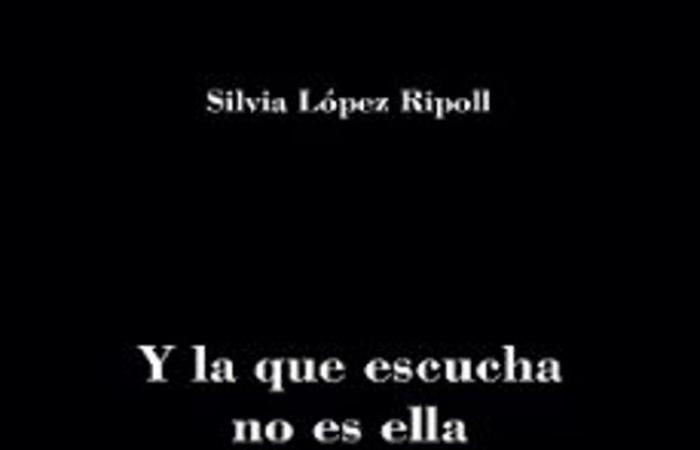With these lines I would like to draw attention to the recent appearance of And the one who listens is not hersecond collection of poems by the Barcelona poet Silvia López Ripoll, recently appeared in the “Baños del Carmen” collection by Ediciones Vitruvio. We must thank its editor Pablo Méndez again for his willingness to bet on the most risky and original proposals.
Silvia López Ripoll is a professor at the University of Barcelona, with a degree in Hispanic Philology, a master’s degree in training teachers of Spanish as a foreign language and the author of various manuals for learning the language. She had previously shown the thematic lines of her poetry with the publication in 2021 of In this long time (Cuadranta Editorial).
“In And the one who listens is not her, The symbols are of a musical matrix. The entire book takes the form of a long symphonic poem in three movements“
What first of all draws the attention of And the one who listens is not heris the presence of what the poet and literary critic TS Eliot, like others before him, called objective correlatea concept that refers to a common thread, a chain of events or symbols that structure the entire collection of poems.
In And the one who listens is not her, The symbols are of a musical matrix. The entire book takes the form of a long symphonic poem in three movements.
In the first of them the motive, or main theme, is expressed; In the middle section—the longest—the theme is developed with all the rhythmic and melodic richness that the poetic sensitivity of its author allows; and finally the third section provides the coda, a recapitulation, or culmination of all that has gone before, which gives the work a sense of closure and finality.
“The author uses it as a tool to examine her own feelings, with the necessary detachment. And even more, she significantly tells us thato essential is to be transparent“
If we talk about that underlying theme that structures the entire collection of poems, Silvia López Ripoll sets herself a major challenge by placing as the driving axis of the book, the search for harmony, for a personal, intimate language that responds to the chords sometimes beautiful, sometimes painful, but always messy of life. So thatthe center of the book is a presence that tries to order the great pentagram of the world, with that conductor’s baton that is the word.
The author names that kind of inquisitive passenger that intimately accompanies every creator, as a being that listens attentively within her, but that is not herself, a presence that When he knocks on your door / you tell him / come in / and his steps are like notes.
With this resource López Ripoll makes use, brilliantly, it must be said, of a recurring element in universal literature: the figure of doppelgangeror double, the symbolic embodiment of a problematic self. The author uses it as a tool to examine her own feelings, with the necessary detachment. And even more, she significantly tells us thato essential is to be transparent. Poets like José Angel Valente, among others, have spoken about that state of transparency, about emptying oneself and letting the world in.
Poetry, then, of strangeness, poetry of stupor, lyrical of astonishment.
“The intuition that there is something connatural to our relationship with the world, the search for a latent, underlying, innate song“
Silvia López Ripoll demonstrates in this book that she knows a few things that make her unique within the current poetic panorama, often so staid. Among other things, he knows that poetry is above all music. And that music is an eye in the poet’s head, a form of inner gaze. The poem is not only a kind of tuning fork that vibrates before the resonance of everything that comes to us from outside, it is also that something inexplicable that we scrutinize within ourselves, a rhythm before the song, as she herself clarifies to us.
And it cannot be denied that every artistic, musical, poetic expression has, in part, something of the echo of one’s own personal experience.. And yet, there is a breed of poets, to which López Ripoll belongs, who put all their attention on that echo, not to reproduce it, but to analyze it and break it down into its primordial elements, to go beyond; to a recognition of the poetic fact in its genesis, with the purpose of distilling that material, so subtle and so fragile, that it is barely an accent, or an intuition. The intuition that there is something innate to our relationship with the world, the search for a latent, underlying, innate song.
music beats with me to take me / to the substance / that dies every day in memory / and not in the heart of each thing
The substance—let’s reread it carefully—that dies in memory and not in the heart of each thing. This is how Silvia López Ripoll’s desire to get to the bottom of things is manifested. It is, in short, a fight to put the world, your world, in order. Since that is the way that poets have to free themselves from the restlessness of being, to respond to an atavistic rhythm in the blood that He turns everything he plays into sheet music.
As an example, some of the elements that resonate in that score and throughout the collection of poems could be listed:
“A pointillist symphony that tries to capture the impalpable. It is a lyrical and musical flow of consciousness, but also a oriented and systematic search“
The weather, the wind, drums, birds, rock vinyl, gardens, the sea, gallops, enigmas, dogs, streets, a sudden gunshot, a stampede of bison under the ceiling, snow, the radio, the steaming kettle, a butterfly crashing against the light bulb, a blues, a snake charmer’s flute, a mosquito, a cicada, jazz, the entire earth, burning volcanoes, suns… It is a true polyphony that besieges that being that lives in the center of And the one who listens is not her. The poems are partly flashes of memory, and partly a swarm of lights, reflections, faces, chosen objects, chosen by attention or by memory. A pointillist symphony that tries to capture the impalpable. It is a lyrical and musical stream of consciousness, but also a oriented and systematic search.
But where do you hide / when the noise / the violence / when schedules / quantities / tired arms / where do you hide / when I gallop / through the devil’s fields / and nothing is conscious / and the roar / of the dogs / in the park / and I only see a tree / with a tiny / green leaf.
Definitely And the one who listens is not her, is an exploration of the nature of the creative act. A look at that point where life experience, search for meaning, meta-reflection on one’s own poetry, musical pulse, and even contemplation of nature intertwine. The book flows, mixing sensory images with abstract thought and emotion. Addressing everything with the depth of a conversation between world and spirit. The essence of that communication is the key to everything: How to express the complicated balance that constitutes the quintessence of the beauty and mystery of the poetic fact?
Silvia López Ripoll achieves it, building a detailed world, a scaffolding made of rhythm, harmony and symbol, emotionally resonant, and which is also a celebration of creativity and life itself.
You know / you are fertile / love / because we always make you / a new melody / and the one who listens / the one who listens / is not her / she only moves / the notes from a distance / and you use her voice to sing.
—————————————
Author: Silvia López Ripoll. Qualification: And the one who listens is not her. Editorial: Vitruvius. Sale: House of the book.
0/5
(0 Ratings. Rate this article, please)






